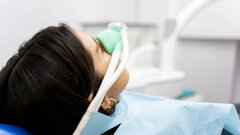LONDON, UK: In line with general medical practices and hospitals, dental practices in the UK for the first time prescribed fewer antibiotics last year. According to a new report issued by Public Health England (PHE) as part of the English surveillance programme for antimicrobial utilisation and resistance (ESPAUR), dentists gave out approximately 7 per cent less of the two most prescribed antibiotics, amoxicillin and metronidazole, in 2015 than in 2014.
Across all health sectors, 2.2 million fewer antibiotic prescriptions were dispensed in the community last year. The overall consumption of antibiotics in 2015 was 21.8 defined daily dose per 1,000 inhabitants per day, a 4.3 per cent decrease from the 22.9 DDD recorded by PHE in the previous year, the report states.
Dentists are currently responsible for 5 per cent of antibiotic prescriptions, with the overall majority given out by general medical practitioners and hospitals.
The figures are relevant in view of the roll-out of a new dental toolkit developed by the dental subgroup of ESPAUR in collaboration with the Faculty of General Dental Practice (FGDP) and the British Dental Association (BDA). It includes an easy self-audit tool and patient-facing posters and leaflets to support effective antimicrobial stewardship in dentistry.
“Dentists have a vital role to play in keeping antibiotics working. Audit helps us fulfil our professional responsibility only to prescribe antibiotics when it is appropriate to do so, and the new tool is an easy way to measure our practice against clinical guidance, and identify, implement and sustain any changes we need to put in place,” FGDP Dean Dr Mick Horton said.
Dentists are able to download the free toolkit from both the BDA and FGDP websites.
Despite the drop in prescriptions, resistance to antibiotics is further on the rise across all sectors in the UK. The proportion of bloodstream infections resistant to piperacillin/tazobactam, the most frequently used combination antibiotic for the treatment of sepsis, for example, has increased by almost 50 per cent over the last four years.
The government has vowed to reduce inappropriate prescribing by 50 per cent by 2020 to tackle the problem.
CAMBRIDGE, UK: While dentists only prescribe 10 per cent of all antibiotics in the UK, they often prescribe them inappropriately. Over-prescription of ...
LONDON, UK: According to a new study, dentists in England wrote 25% more prescriptions for antibiotics between April and July 2020 than they did during the ...
MANCHESTER, UK: Dental guidelines in the UK, as in many countries, are predicated upon the knowledge that dental infections respond better to treatment ...
LONDON, UK: A newly released report on the high street dental segment in the UK has reignited concerns regarding a lack of funding for NHS dental services. ...
LEEDS, England: While antibiotics remain essential for treating infectious diseases, their global efficacy is declining owing to the rise of antimicrobial ...
LONDON, England: The UK’s General Dental Council has emphasised its commitment to understanding and monitoring the evolving impact of artificial ...
LONDON, UK: To help dental teams play their part in tackling the problem of antimicrobial resistance, the College of General Dentistry and Faculty of Dental...
LONDON, England: The UK College of General Dentistry has released the third edition of Standards in Dentistry, a comprehensive and freely accessible online ...
SHEFFIELD, UK: Currently, the National Institute for Health and Care Excellence (NICE) guidelines recommend that dentists should generally not use ...
SHEFFIELD, UK: Scientists at the University of Sheffield have identified a significant rise in the number of people diagnosed with a serious heart infection...
Live webinar
Tue. 24 February 2026
6:00 pm UTC (London)
Prof. Dr. Markus B. Hürzeler
Live webinar
Tue. 24 February 2026
8:00 pm UTC (London)
Prof. Dr. Marcel A. Wainwright DDS, PhD
Live webinar
Wed. 25 February 2026
4:00 pm UTC (London)
Prof. Dr. Daniel Edelhoff
Live webinar
Wed. 25 February 2026
6:00 pm UTC (London)
Live webinar
Thu. 26 February 2026
1:00 am UTC (London)
Live webinar
Tue. 3 March 2026
4:00 pm UTC (London)
Dr. Omar Lugo Cirujano Maxilofacial
Live webinar
Wed. 4 March 2026
1:00 am UTC (London)
Dr. Vasiliki Maseli DDS, MS, EdM



 Austria / Österreich
Austria / Österreich
 Bosnia and Herzegovina / Босна и Херцеговина
Bosnia and Herzegovina / Босна и Херцеговина
 Bulgaria / България
Bulgaria / България
 Croatia / Hrvatska
Croatia / Hrvatska
 Czech Republic & Slovakia / Česká republika & Slovensko
Czech Republic & Slovakia / Česká republika & Slovensko
 France / France
France / France
 Germany / Deutschland
Germany / Deutschland
 Greece / ΕΛΛΑΔΑ
Greece / ΕΛΛΑΔΑ
 Hungary / Hungary
Hungary / Hungary
 Italy / Italia
Italy / Italia
 Netherlands / Nederland
Netherlands / Nederland
 Nordic / Nordic
Nordic / Nordic
 Poland / Polska
Poland / Polska
 Portugal / Portugal
Portugal / Portugal
 Romania & Moldova / România & Moldova
Romania & Moldova / România & Moldova
 Slovenia / Slovenija
Slovenia / Slovenija
 Serbia & Montenegro / Србија и Црна Гора
Serbia & Montenegro / Србија и Црна Гора
 Spain / España
Spain / España
 Switzerland / Schweiz
Switzerland / Schweiz
 Turkey / Türkiye
Turkey / Türkiye
 UK & Ireland / UK & Ireland
UK & Ireland / UK & Ireland
 International / International
International / International
 Brazil / Brasil
Brazil / Brasil
 Canada / Canada
Canada / Canada
 Latin America / Latinoamérica
Latin America / Latinoamérica
 USA / USA
USA / USA
 China / 中国
China / 中国
 India / भारत गणराज्य
India / भारत गणराज्य
 Pakistan / Pākistān
Pakistan / Pākistān
 Vietnam / Việt Nam
Vietnam / Việt Nam
 ASEAN / ASEAN
ASEAN / ASEAN
 Israel / מְדִינַת יִשְׂרָאֵל
Israel / מְדִינַת יִשְׂרָאֵל
 Algeria, Morocco & Tunisia / الجزائر والمغرب وتونس
Algeria, Morocco & Tunisia / الجزائر والمغرب وتونس
 Middle East / Middle East
Middle East / Middle East


















































To post a reply please login or register